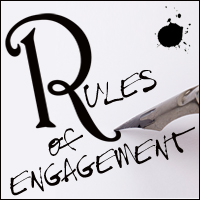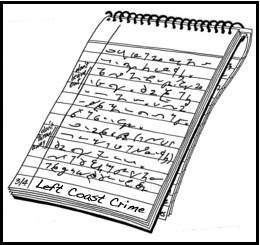.
 A blog for fiction writers and impending writers. An editor’s perspective.
A blog for fiction writers and impending writers. An editor’s perspective.
• Next post • Previous post • Index
Perfection.
Ah, that elusive, manipulative, petulant little imp known as perfection. I mention the illusion of perfection in a previous post (See: Where to Start) but it bears repeating. Rule #25: Perfection in writing doesn’t exist. Stop trying to find it.
If you’re goading or flagellating or juicing yourself into writing a perfect novel, waiting for all those perfect ideas to fall—bump, bump, bump—into place, understand that you’ll discover no Holy Grail. No perfect chapter, nor page nor sentence occurs in a writer’s reality. Any word, any phrase, any idea, can be altered. Nudged. Tweaked. Deleted. As a writer, I can spend the remainder of my lonely days chasing a phantom that doesn’t exist—or I can sit down and write a story to the best of my ability. To the successful writer (or at least to a sane, successful writer), the glass is always half full. Knowing when to “leave it be” is key.
As scribes, we accept our limitations and strive for a single goal: Doing the best we can. So here’s Rule #4: Do the best you can.
Don’t think of Rule #4 as settling for meh. Rule #4 isn’t about compromising your talents, it’s about stretching your genius—taking the time and making the effort—and trusting that your next book will be a tad better than your last. Only in a world unencumbered by perfection does room for improvement exist.
I bring up the notion of perfection again because I suspect a vast number of novice writers begin a manuscript with the expectation of reaching literary nirvana, the anticipation of soon seeing themselves at #1 on NYTBSL. Somewhere around page 3 or 30 or 300, those writers begin to realize instant fame isn’t going to happen. Some give up, leaving talent and a worthy, half-finished (and perhaps nearly awesome) effort behind. Pity.
I’m personally aware of several writers—and very good writers—who’ve been slowly chipping away at the same novel for years. Why? Some of us are seeking perfection, and not finding it, or maybe we’re simply seeking “good enough” and not finding that, either. (Occasionally we’re simply methodical writers—and that‘s a damn good excuse. A word of advice: Write at your own pace. Writing a novel isn’t a race, it’s an achievement.)
However…! Seeking perfection (and not finding it) is an entirely different dilemma. Occasionally, a story isn’t good enough. One’s writing isn’t fully developed or else bumps into impossible obstacles that we find ourselves unqualified or emotionally unable to handle. Most of us have a novel (or two) that has “gotten away”…that sits unfinished in our closets or in some obscure folder on our desktop. And that’s okay too. I consider those failed attempts to be a necessary learning curve. Those manuscripts are part of the process, part of our eventual success. Let them rest in peace.
So what are a few possibilities for a stalled manuscript?
- Seeking perfection. Right. Doesn’t exist. Refer to the above.
- Fear of failure. Understandable. Although… d’ju know what’s worse? Thinking you might have the gift, but not even trying. On your deathbed, trust me, that’ll be a big regret. You’ve been warned.
- Fear of success. Although I’m not sure why. Talent deserves success.
- Fear of the future (good or bad). As in…what if it doesn’t sell? What if it sells big, but my next book sucks? What if people begin to love me for all the wrong reasons? Or hate me for all the right reasons? What if I take a tumble heading toward the stage to collect my Pulitzer. Please refer again to Rule #100: Get Over Yourself. (In it’s own humbling way, it really should be Rule #1.)
- Writer’s block. Yeah…a bummer, but the phrase ‘writer’s block’ is really a catch-all for various reasons not to write: An emotional, psychological or physical fatigue when words and their meaning become lost in a haze, or simply run away from your brain. You’re overtired or stressed or simply out of ideas. Don’t worry, because the empty vessel will eventually refill. But if the vacuum persists, it’s possibly something else. Eventually, it becomes an excuse (valid or otherwise). One can insist to family and friends “I have writer’s block,” for a year or two…but then we just smile politely and realize the book’s not forthcoming. (It’s OK, we still love you.) But either the book’s wrong for you, or you’re wrong for the book. And, hey, it’s not your fault. For creative folk, new ideas are always forthcoming.
……I wanted to be an astronaut once. Never was. Moon block. By the way, my own personal solution for writer’s block? Stepping away from the computer and watching a Firefly or True Blood marathon—and guilt-free, because self-loathing will ultimately get you nowhere!—or else reading a book I absolutely love… for the 4th or 5th time. (Recently for me: The World According to Garp, The Forever War, The Sirens of Titan and Elmore Leonard’s Cat Chaser.) When my eyes blur or my head clogs, I clean the garage or drive up the coast. I give myself permission to declare a mental-health holiday from writing. It’s part of the process. If you find that your mind’s still writhing with uncorked creativity, write a short story or work on an outline. Dream up another novel. Paint a picture. Take some photos. Often, alternate forms of creativity can replenish your writer’s drive. Give it time. That creative lust will eventually return. - Fear of ridicule. (Rare, but it happens.) Your friends may find you pretentious for even trying. Seriously? Find new friends.
- Fear of offending somebody. And that somebody is usually a friend or family member, and a typically unsavory character prominently featured in your tale. Sorry, Aunt Lucy! The homicidal maniac in chapter 8 isn’t really you. Trust me, they won’t see themselves in your book. Just be sure that you change the names.
- Fear of offending yourself. Ah, but here’s where the circle closes. We’re back to looking for perfection. Refer to Rule #25 again.
While I have no degree in shrinkology, most fiction writers are somewhat familiar with the above ambiguities. Most writers can relate. So… don’t worry, just write.
.
• Next post • Previous post • Index
.
.
 While I’ve long been an advocate and frequent attendee of the California Writers Conference scene, the
While I’ve long been an advocate and frequent attendee of the California Writers Conference scene, the